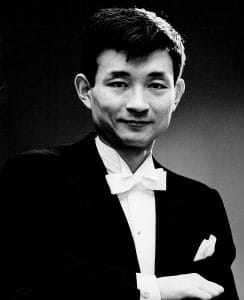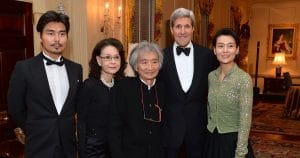A musician, from age 7 Ozawa studied classical piano, concentrating on Bach. As a teen in Japan, he was playing rugby when he badly broke two fingers — not great for a pianist. His teacher at the Toho Gakuen School of Music took him to a performance of Beethoven’s Piano Concerto No. 5, and Ozawa had a revelation: he switched his focus to conducting. While still a student, he was able to conduct the NHK Symphony Orchestra and the Japan Philharmonic. He won first prize at the 1959 International Competition of Orchestra Conductors in Besançon, France, bringing him international fame — and an offer to study with Charles Munch, the music director of the Boston Symphony Orchestra at the Berkshire Music Center (now the Tanglewood Music Center). He very quickly won the Koussevitzky Prize for outstanding student conductor, Tanglewood’s highest honor, which earned him a scholarship to study conducting with Herbert von Karajan.

That was hardly the pinnacle: he then caught the attention of Leonard Bernstein, who appointed him as assistant conductor of the New York Philharmonic. He conducted at Carnegie Hall in 1961, and the San Francisco Symphony in 1962. On the other hand, he was snubbed by the NHK Symphony Orchestra, so he conducted their rival, the Japan Philharmonic Orchestra, instead. He was then appointed the principal conductor of the Ravinia Festival, the summer home of the Chicago Symphony Orchestra, and then the 1966 Salzburg Festival with the Vienna Philharmonic.
Ozawa was inundated with prestigious offers, including music director of the Toronto Symphony Orchestra (1965 to 1969), and then the San Francisco Symphony (1970 to 1976), where he led that symphony in their first recordings in a decade, and took them on a European tour — and still found time to also be the music director of the Boston Symphony Orchestra, a position he held for 29 years. Ozawa may be best known outside music circles as the conductor of a simultaneous international performance of Beethoven’s Ode to Joy at the opening ceremony of the 1998 Winter Olympics in Nagano, Japan, leading an orchestra and singers in Nagano with choruses linked in from Beijing, Berlin, Cape Town, New York City, and Sydney.

Ozawa finally stepped down from the Boston Symphony Orchestra in 2002 to become the principal conductor of the Vienna State Opera. But health problems hit in 2010, including esophageal cancer, pneumonia, and surgery on his back. He sat for multiple interviews with a writer to produce the book Absolutely on Music * (2017), “A deeply personal, intimate conversation about music and writing between the internationally acclaimed, best-selling author and the former conductor of the Boston Symphony Orchestra.” Maestro Ozawa died at his home in Tokyo from heart failure on February 6. He was 88.

Finally, an HU whose name I recognized. Then again, my dad was a college music prof and conductor and played briefly under Bernstein.
His time in Toronto was game-changing for our orchestra.
I remember being pleasantly surprised when I started hearing his name, and looking back seeing how many from that side of the world have grown to greatness.
I enjoyed his conducting many times at Tanglewood. However my favorite performance was his recording of Carl Orff’s Carmina Burana. Never heard a better one.
—
I’m guessing you mean the one with Kathleen Battle and the Berlin Philharmonic. It’s available in video form on Youtube — all hour+ of it. -rc